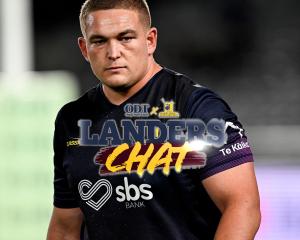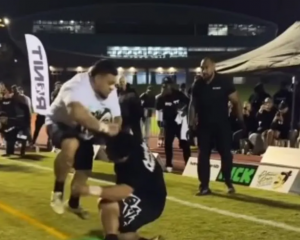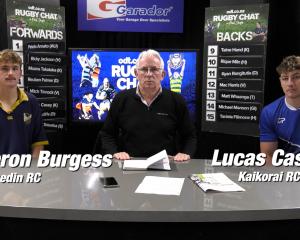We begin our series on gambling in sport with a chat to a problem gambler. ''Dave'' has asked for anonymity. He tells reporter Adrian Seconi about his long struggle to break free from gambling's grip.
It has taken Dave more than 30 years to recognise his good luck for what it really is - a curse.
Like the time he won $17,000 on a $1 Pick6 bet as a 17-year-old. That unfortunate event helped foster a fledgling addiction.
Winning $40,000 at the track with his dad cemented a habit which was getting out of control.
And the $84,000 he won on a quaddie, well, that windfall helped fuel the 46-year-old Aucklander's most destructive tendencies.
''They say the worst thing for a gambler is good luck,'' Dave begins.
''Even to this day, I have this belief that I won more than I lost.''
He didn't, of course. He lost so, so much more. And not all of it money.
''Some people will lose $20 on the All Blacks and say they are never going to gamble again. For me, it was all about getting it back and the thrill of the chase.
''I just loved the idea of chasing something, of living this amazing life. But when I gave up gambling, I had no friends whatsoever.''
He also had an ex-wife. Criminal convictions. Three children who were unsure whether they could rely on their father. He had gambled away everything precious to him.
As a child, Dave connected with his father by picking horses. His dad would lay the bets.
''We used to pick horses each weekend. And that is very much how our relation[ship] was. He would give us money whenever he won and it was just exciting. I loved it. I absolutely loved it.
''When my father died ... there became a certain numbness to what I was doing.''
That was 15 years ago and the bets got bigger and so did the lies.
''I always had another account which [my wife] did not know about. And I was actually starting to get quite resentful about giving her a couple of hundred dollars because that was my gambling money.
''Out of everything else, I didn't want my gambling money to run out. When it did run out, I started committing fraud at work.''
The sales representative would ''cook the books''.
''I was able to purchase stuff which didn't exist and get paid for it. I also borrowed money off a friend when he sold a house. And before I knew it, that was $10,000.''
A Warriors' fan, Dave would put ridiculous bets on just to be the ''big shot'' or to annoy his rugby-loving friends. But being the big shot was costing - a lot. By the early 2000s he was betting up to $2000 a week.
''It was all about being a show pony and all about my image. I was still in denial and I thought all I needed to do was stop but I couldn't.''
He sort of did for about six months. He had lost his job and was no longer able to fund his habit to the same level.
He still got the ''odd quick fix''. The Melbourne Cup completed his derailment. His wife asked him to pick a trifecta for her syndicate at work.
They won. People bought him chocolates and wine and gave him money.
''It fed that ego. I had a massive ego. Not now, I hope, but it fed back into it. People liked me again.
''I've spent my whole life trying to fit in . . . and all I wanted was for people to like me. That's why hanging out at the TAB and doing all that stuff was exciting.''
When he separated from his wife - they were a couple for 26 years - in December 2009, he started drinking heavily and gambling more.
''All I wanted to do was sell the house so I had more money to gamble. Don't get me wrong, it hurt.
"Believe me, it hurt. I didn't just leave my wife, I left three kids as well. It was a bit of a train wreck and that is where the alcohol came in.''
He received $78,000 from the sale of the family home and moved to Auckland's CBD to ''party like a teenager''.
He won $84,000 on a quaddie shortly after and life spiralled out of control.
''I had a 22-year-old girlfriend I met at the bar drinking. We got drunk, did drugs and gambled all day, every day.
''Sometimes it was $5000 a day, sometimes over $10,000 a day - winning and losing. By the beginning of 2011, I had lost all that money.''
He went on a crime spree and ''was virtually on the run from the police''.
''I'd stolen off a friend. I'd stolen scrap metal from his business and not long after that I got arrested.''
He was sentenced in October but avoided jail, he says, because ''I had said all the right things''.
His mental state may also have played a part.
''I bought a hand gun to shoot myself. Someone gave me a bottle of bourbon and I got drunk and forgot to kill myself.''
It was a cry for attention. The next day he went to AA. He thought he had beaten the gambling as well.
He was, he says, ''doing really well''. In reality, he was still chained to gambling, just not spending as much. But that was about to change.
There was talk of his son moving in with him at his flat in Parnell. That news brought excitement but also anxiety.
''I had a lot of fear around that. Fear of being a failure and fear of failing as a father.''
He went back to what he had known all his life.
He put $5000 on the company credit card and gambled it all away during the Christmas holiday period last year.
Dave was confronted by his employer and was forced to face his gambling addiction with an honesty he had previously been unable to muster.
He was not sacked and has since repaid his debt, and has not been tempted gamble since.
''I know where it will take me, so why would I do that? It is like shooting yourself in the foot and saying, would I do that again? The pain would be too much.''
He now spends his spare time helping others by sharing his story and offering support.
''It is an amazing turnaround for someone who was so self-centred. For me, it is about having a belief, having a faith that everything is going to be OK.''
TOMORROW: Problem Gambling Foundation of New Zealand chief executive Graeme Ramsey on the scale of the problem.
• For help with problem gambling, people can call the Problem Gambling Foundation on 0800 664-262. Its counselling service is free and confidential. Alternatively, you can email help@pgfnz.org.nz or visit online at www.pgfnz.org.nz












